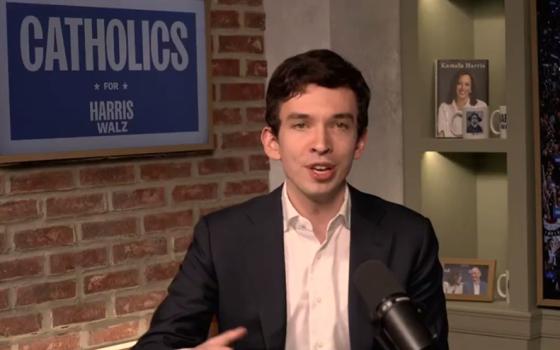By JOHN L. ALLEN JR.
New York
Revolutions, as anyone who has taken History 101 knows, happen not in conditions of despair, but when things are getting better – just not fast enough to match people’s expectations. St. Augustine once phrased the point by saying that “anger is the daughter of hope.”
Turbulence, in other words, is often a byproduct of progress. The past week offered an example of the point with regard to relations between Catholicism and Islam, which were given a significant boost by the pope’s Nov. 28-Dec. 1 trip to Turkey, and especially his moment of silent prayer inside the Blue Mosque with Istanbul’s Grand Mufti, Imam Mustafa Cagrici.
Without that icon of inter-faith fraternity, Spain’s Islamic Board might not have decided to dust off an old campaign to regain access to the Cathedral of Our Lady of the Assumption in Cordoba in southern Spain, once a great mosque during the period of Islamic rule, then converted into a church in 1236 as part of the Catholic reconquista.
The cathedral, built under King Ferdinand III, left much of the original Moorish architecture intact, and is considered a United Nations World Heritage site. The mihrab from the old mosque, the recess in the southeastern wall that indicates the direction of Mecca, is on the outside of the present-day cathedral, which makes it possible for Muslims to pray without entering.
For years, some Islamic groups in Spain have sought either the restitution of the cathedral, or its conversion into an inter-faith place of worship. In December, the Islamic Board of Spain wrote a letter to Pope Benedict XVI, renewing this request.
“What we wanted was not to take over that holy place, but to create in it, together with you and other faiths, an ecumenical space unique in the world which would have been of great significance in bringing peace to humanity,” the letter said.
“We would like to share with you a prayer, that could serve to awake the conscience of Christians and Muslims and prove that it is possible to bury past confrontations,” the letter added. The letter specifically cited Benedict’s prayer in the Blue Mosque, facing Mecca, as a precedent.
The Islamic Board had addressed a similar request in 2004 to the Pontifical Council for Inter-religious Dialogue. That request was brushed off by Archbishop Michael Fitzgerald, who at the time was the Vatican’s top official for inter-faith relations.
“It is difficult to have Christians and Muslims living together, and sharing a common civic and religious life, if they are always driven by the desire to go back in time or take some form of vengeance,” Fitzgerald said. “One has to accept history and move forward.”
Fitzgerald noted that there are many famous Christian places of worship converted into mosques, such as Hagia Sophia in Istanbul and the Grand Omayyad Mosque in Damascus. Both have been visited by popes who did not demand that they be returned to Christian use. (Paul VI dropped to his knees in prayer in Hagia Sophia in 1967, an act interpreted by some as a symbolic way of “reclaiming” the former Byzantine cathedral. Both John Paul II in 1979 and Benedict XVI in November avoided repeating the gesture, precisely to avoid raising such fears).
Predictably, the latest request has also been rejected by Catholic officials.
“It would not contribute to the peaceful co-existence of people of different religions. The joint use of temples and places of worship would only generate confusion among the faithful,” said the Bishop of Cordoba, Juan Jose Asenjo.
The Bishops’ Conference of Spain said earlier this month it “did not recommend Muslims to pray in any way inside the Cathedral” and also rejected the idea of making it an inter-faith place of prayer.
Next, the Islamic Board proposed a moment of joint prayer somewhere else between Asenjo and Mansur Escudero, the board’s president, as a sort of local version of what happened in the Blue Mosque. Escudero suggested having the joint prayer in the Mosque of Almodóvar.
That too proved a non-starter; Fr. Manuel González, the Ecumenical and Inter-Religious Affairs official for the Cordoba diocese, called the proposal “inopportune” and said that joint prayer should be reserved for “special occasions.”
Further, González said, the controversy generated by the Islamic Board’s campaign to gain access to the cathedral renders the proposal especially problematic.
Another Islamic body in Spain, the Spanish Federation of Islamic Religious Organizations, has requested talks with the church about the return of properties seized during the reconquista, citing specifically the Cordoba cathedral. A spokesperson compared the request to the efforts of labor unions in Spain to reclaim patrimony seized under Franco. He also cited the case of Algeria in the 1960s, when, in accord with the local bishop, churches no longer in use were given over for use by Muslims.
Over the years, city officials in Cordoba have at times signaled support for the Muslim proposal, which has provoked irritation from senior Catholic leaders. Fr. Samir Khalil, a Catholic priest of Egyptian origin, who divides his time between teaching assignments at St. Joseph’s University in Beirut and the Pontifical Institute of Oriental Studies in Rome, said in 2004, “The support given by certain Spanish government leaders in the city makes it all the more manifest just how much Europe has lost its identity.”
What all this perhaps illustrates is that the pope's Turkey trip raised expectations in Islamic quarters of further dramatic gestures from the Catholic side, and that some of those expectations are destined to go unfulfilled, especially if they involve proposals that, from the point of view of Catholic officialdom, risk syncretism or a further dilution of the “Christian roots” of historically Catholic regions.
If the familiar cycle of rising-expectations-met-by-frustration is not to be played out anew in Catholic/Muslim relations, Benedict XVI and other senior Catholic officials, as well as their Muslim counterparts, may need to consider new initiatives or gestures that would pass doctrinal muster, but which would also fire imaginations on both sides. Otherwise, the hope generated by Turkey may wind up consumed largely in anger generated by distractions such as the controversy in Cordoba – a consummation, most observers would agree, devoutly not to be wished.




